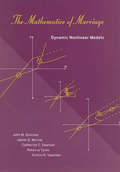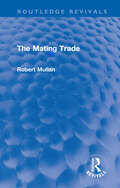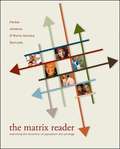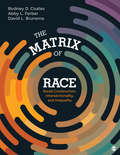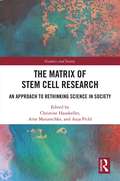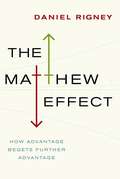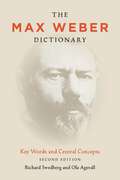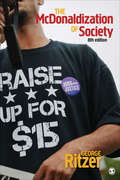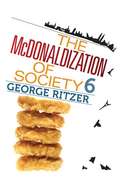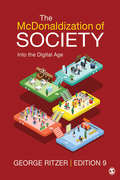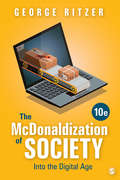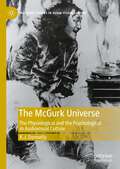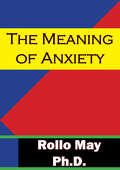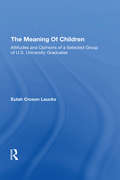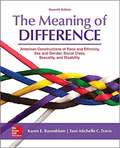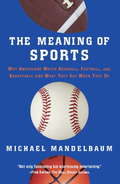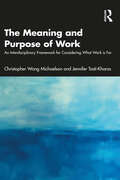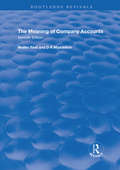- Table View
- List View
The Mathematics of Marriage: Dynamic Nonlinear Models
by John M. Gottman James D. Murray Catherine C. Swanson Rebecca Tyson Kristin R. SwansonDivorce rates are at an all-time high. But without a theoretical understanding of the processes related to marital stability and dissolution, it is difficult to design and evaluate new marriage interventions. The Mathematics of Marriage provides the foundation for a scientific theory of marital relations. The book does not rely on metaphors, but develops and applies a mathematical model using difference equations. The work is the fulfillment of the goal to build a mathematical framework for the general system theory of families first suggested by Ludwig Von Bertalanffy in the 1960s. The book also presents a complete introduction to the mathematics involved in theory building and testing, and details the development of experiments and models. In one "marriage experiment," for example, the authors explored the effects of lowering or raising a couple's heart rates. Armed with their mathematical model, they were able to do real experiments to determine which processes were affected by their interventions. Applying ideas such as phase space, null clines, influence functions, inertia, and uninfluenced and influenced stable steady states (attractors), the authors show how other researchers can use the methods to weigh their own data with positive and negative weights. While the focus is on modeling marriage, the techniques can be applied to other types of psychological phenomena as well.
The Mating Game: How Gender Still Shapes How We Date
by Ellen LamontDespite enormous changes in patterns of dating and courtship in twenty-first-century America, contemporary understandings of romance and intimacy remain firmly rooted in age-old assumptions of gender difference. These tenacious beliefs now vie with cultural messages of gender equality that stress independence, self-development, and egalitarian practices in public and private life.Through interviews with heterosexual and LGBTQ individuals, Ellen Lamont’s The Mating Game explores how people with diverse sexualities and gender identities date, form romantic relationships, and make decisions about future commitments as they negotiate uncertain terrain fraught with competing messages about gender, sexuality, and intimacy.
The Mating Trade (Routledge Revivals)
by Robert MullanAre marriages made in heaven? In reality many people need a little help in the arrangement of such matters, whether from Jewish shadkhans (matchmakers), go-betweens, computer or video-dating agencies, marriage bureaux, Asian arranged marriages, gay dating agencies or personal ads. Originally published in 1984, the author’s clear-sighted look at the mating trade takes some of the mystique away from the subject and is the first serious and detailed account of the ‘third party’ in marriage. Dr Mullan looks at the ‘singles scene’ and the ‘arranged marriage’ historically and cross-culturally, and makes it clear that there is nothing necessarily odd or deviant about the mating trade. It is a business like any other, and as long as people continue to want ‘perfect partners’, marriage, permanent relationships, dates and sex, and while evolving social structures make such demands ever more difficult to meet, the business will thrive. It could even expand and grow, but the author believes that first it will have to clean up its act!
The Matrix Reader: Examining the Dynamics of Oppression and Privilege
by Abby L. Ferber Christina M. Jimenez Andrea O'Reilly Herrera Dena R. SamuelsWritten by four authors from different disciplinary backgrounds, this reader promotes a commitment to an intersectional approach to teaching race, class, gender and sexuality. Unlike most books of its kind, it highlights the duality of privilege and oppression and the effects that race, gender, and sexuality have on our lives. This reader includes poems, reflective literary prose, historical events and documents, images drawn from the media, contemporary statistics of inequalities, visual images, and tools that empower students to become agents for social change.
The Matrix of Race: Social Construction, Intersectionality, And Difference
by Abby L. Ferber David L. Brunsma Rodney D. CoatesThe Matrix of Race, for race and ethnic relations courses, is written by three leading scholars -- Rodney D. Coates, David L. Brunsma, and Abby L. Ferber -- and reflects a very contemporary way of looking at race, minorities, and intergroup relations. Older texts use a "categorical" approach and feature a series of chapters that examine one minority group at a time (African Americans, Latino/a Americans, Asian Americans, Native Americans, etc.). Newer texts designed within the last 5-10 years are more likely to be organized topically, discuss various racial and ethnic minorities within the context of these topics, and use the most current theories and perspectives in this field. The Matrix of Race is built around these core ideas: -Race is a both a social construction and a social institution -Race is intersectional--it is embedded within other statuses (such as gender, social class, sexuality) -Concepts of race change over time and as we move from one physical location to another -We are all active agents in upholding, reproducing, or resisting constructions of race.
The Matrix of Race: Social Construction, Intersectionality, and Inequality
by Abby L. Ferber Rodney D. Coates Dr David L. BrunsmaThe Matrix of Race, for race and ethnic relations courses, is written by three leading scholars -- Rodney D. Coates, David L. Brunsma, and Abby L. Ferber -- and reflects a very contemporary way of looking at race, minorities, and intergroup relations. Older texts use a "categorical" approach and feature a series of chapters that examine one minority group at a time (African Americans, Latino/a Americans, Asian Americans, Native Americans, etc.). Newer texts designed within the last 5-10 years are more likely to be organized topically, discuss various racial and ethnic minorities within the context of these topics, and use the most current theories and perspectives in this field. The Matrix of Race is built around these core ideas: -Race is a both a social construction and a social institution -Race is intersectional--it is embedded within other statuses (such as gender, social class, sexuality) -Concepts of race change over time and as we move from one physical location to another -We are all active agents in upholding, reproducing, or resisting constructions of race.
The Matrix of Stem Cell Research: An Approach to Rethinking Science in Society (Genetics and Society)
by Christine Hauskeller Arne Manzeschke Anja PichlStem cell research has been a problematic endeavour. For the past twenty years it has attracted moral controversies in both the public and the professional sphere. The research involves not only laboratories, clinics and people, but ethics, industries, jurisprudence, and markets. Today it contributes to the development of new therapies and affects increasingly many social arenas. The matrix approach introduced in this book offers a new understanding of this science in its relation to society. The contributions are multidisciplinary and intersectional, illustrating how agency and influence between science and society go both ways. Conceptually, this volume presents a situated and reflexive approach for philosophy and sociology of the life sciences. The practices that are part of stem cell research are dispersed, and the concepts that tie them together are tenuous; there are persistent problems with the validation of findings, and the ontology of the stem cell is elusive. The array of applications shapes a growing bioeconomy that is dependent on patient donations of tissues and embryos, consumers, and industrial support. In this volume it is argued that this research now denotes not a specific field but a flexible web of intersecting practices, discourses, and agencies. To capture significant parts of this complex reality, this book presents recent findings from researchers, who have studied in-depth aspects of this matrix of stem cell research. This volume presents state-of-the-art examinations from senior and junior scholars in disciplines from humanities and laboratory research to various social sciences, highlighting particular normative and epistemological intersections. The book will appeal to scholars as well as wider audiences interested in developments in life science and society interactions. The novel matrix approach and the accessible case studies make this an excellent resource for science and society courses.
The Matthew Effect: How Advantage Begets Further Advantage
by Daniel RigneyThe old saying does often seem to hold true: the rich get richer while the poor get poorer, creating a widening gap between those who have more and those who have less. The sociologist Robert K. Merton called this phenomenon the Matthew effect, named after a passage in the gospel of Matthew. Yet the more closely we examine the sociological effects of this principle, the more complicated the idea becomes. Initial advantage doesn't always lead to further advantage, and disadvantage doesn't necessarily translate into failure. Does this theory need to be revisited?Merton's arguments have significant implications for our conceptions of equality and justice, and they challenge our beliefs about culture, education, and public policy. His hypothesis has been examined across a variety of social arenas, including science, technology, politics, and schooling, to see if, in fact, advantage begets further advantage. Daniel Rigney is the first to evaluate Merton's theory of cumulative advantage extensively, considering both the conditions that uphold the Matthew effect and the circumstances that cause it to fail. He explores whether growing inequality is beyond human control or disparity is socially constructed and subject to change. Reexamining our core assumptions about society, Rigney causes us to rethink the sources of inequity.
The Max Weber Dictionary: Key Words and Central Concepts, Second Edition
by Richard Swedberg Ola AgevallMax Weber is one of the world's most important social scientists, but he is also one of the most notoriously difficult to understand. This revised, updated, and expanded edition of The Max Weber Dictionary reflects up-to-the-moment threads of inquiry and introduces the most recent translations and references. Additionally, the authors include new entries designed to help researchers use Weber's ideas in their own work; they illuminate how Weber himself thought theorizing should occur and how he went about constructing a theory. More than an elementary dictionary, however, this work makes a contribution to the general culture and legacy of Weber's work. In addition to entries on broad topics like religion, law, and the West, the completed German definitive edition of Weber's work (Max Weber Gesamtausgabe) necessitated a wealth of new entries and added information on topics like pragmatism and race and racism. Every entry in the dictionary delves into Weber scholarship and acts as a point of departure for discussion and research. As such, this book will be an invaluable resource to general readers, students, and scholars alike.
The Maximum Security Book Club: Reading Literature in a Men's Prison
by Mikita BrottmanA riveting account of the two years literary scholar Mikita Brottman spent reading literature with criminals in a maximum-security men’s prison outside Baltimore, and what she learned from them—Orange Is the New Black meets Reading Lolita in Tehran.On sabbatical from teaching literature to undergraduates, and wanting to educate a different kind of student, Mikita Brottman starts a book club with a group of convicts from the Jessup Correctional Institution in Maryland. She assigns them ten dark, challenging classics—including Conrad’s Heart of Darkness, Shakespeare’s Macbeth, Stevenson’s Dr. Jekyll and Mr. Hyde, Poe’s story “The Black Cat,” and Nabokov’s Lolita—books that don’t flinch from evoking the isolation of the human struggle, the pain of conflict, and the cost of transgression. Although Brottman is already familiar with these works, the convicts open them up in completely new ways. Their discussions may “only” be about literature, but for the prisoners, everything is at stake.Gradually, the inmates open up about their lives and families, their disastrous choices, their guilt and loss. Brottman also discovers that life in prison, while monotonous, is never without incident. The book club members struggle with their assigned reading through solitary confinement; on lockdown; in between factory shifts; in the hospital; and in the middle of the chaos of blasting televisions, incessant chatter, and the constant banging of metal doors.Though The Maximum Security Book Club never loses sight of the moral issues raised in the selected reading, it refuses to back away from the unexpected insights offered by the company of these complex, difficult men. It is a compelling, thoughtful analysis of literature—and prison life—like nothing you’ve ever read before.
The McDavid Effect: Connor McDavid and the New Hope for Hockey
by Marty KlinkenbergStep into the streets, arenas, coffee shops, and offices of Edmonton, and witness how the arrival of a teenage hockey phenomenon is changing the city's fortunes.Once known as the City of Champions, Edmonton is at a crossroads. As oil prices continue to plummet, the economic outlook grows bleaker by the day. Political changes have ushered in an era of uncertainty. And, as though mirroring the city's fortunes, the Edmonton Oilers continue to struggle on the ice, offering little solace or escape to the city's long-suffering hockey fans. But on June 26, 2015, hope was reborn in Edmonton. With the first overall pick in the NHL Entry Draft, the Edmonton Oilers selected Connor McDavid, a once-in-a-generation talent who, at only eighteen years old, was already being compared to the Great One who had preceded him twenty-five years earlier. Sparked by the arrival of McDavid, the construction of a new state-of-the-art hockey arena, and the development of a revitalized downtown core, a new sensibility began to emerge in Edmonton. Sensing an opportunity, the city started to rebuild and rebrand itself in search of a new future. Through exclusive access, uplifting anecdotes, and colourful interviews, The McDavid Effect traces the renewal of not just a hockey team, but of an entire city. Reflecting the multitude of viewpoints that make up Edmonton--from Connor himself to construction crews at work on the downtown development to business executives directing the new shape of the Albertan capital--The McDavid Effect paints a portrait of the city as it is being reimagined, captures the near-religious reverence people have for sports, and shows how the people of Edmonton are coming to hope again.
The McDonaldization of Society
by Dr George RitzerNow in its Eighth Edition, George Ritzer's McDonaldization of Society continues to stand as one of the pillars of modern day sociological thought. By linking theory to 21st century culture, this book resonates with students in a way that few other books do, opening their eyes to many current issues, especially in the areas of consumption and globalization. Through vivid, story-telling prose, Ritzer provides an insightful introduction to the ways in which the principles of the fast-food restaurant are coming to dominate sectors of American society as well as the rest of the world. This new edition has been fully updated to include a new focus on McDonaldization of the workforce.
The McDonaldization of Society 6, Sixth Edition
by George RitzerThe book demonstrates the power of the sociological imagination to today's readers in a way that few other books have, linking theory to contemporary pop-culture examples that resonate with 21st-century students. This Sixth Edition includes a new concluding Chapter 10 The DeMcDonaldization Society? that examines recent phenomena like Web 2.0 and its relationship to the McDonaldization thesis.
The McDonaldization of Society: Into the Digital Age
by Dr George RitzerThe book that made "McDonaldization" part of the lexicon of contemporary sociological theory, read by hundreds of thousands of students, is now in its Ninth Edition! George Ritzer's seminal work of critical sociology, The McDonaldization of Society, continues to stand as one of the pillars of modern day sociological thought. Building on the argument that that the fast food restaurant has become the model for the rationalization process today, this book links theory to contemporary life in a globalized world and resonates with students in a way that few other books do. Ritzer opens students’ eyes to many current issues and shows how McDonaldization’s principles apply to other settings, especially in the areas of consumption and globalization. Through vivid story-telling prose, Ritzer provides an insightful introduction to this fascinating topic and aids students' critical development. This new edition has been fully updated to include a new focus on McDonaldization in the digital world.
The McDonaldization of Society: Into the Digital Age
by Dr George RitzerThe book that made "McDonaldization" part of the lexicon of contemporary sociological theory, read by hundreds of thousands of students, is now in its Ninth Edition! George Ritzer's seminal work of critical sociology, The McDonaldization of Society, continues to stand as one of the pillars of modern day sociological thought. Building on the argument that that the fast food restaurant has become the model for the rationalization process today, this book links theory to contemporary life in a globalized world and resonates with students in a way that few other books do. Ritzer opens students’ eyes to many current issues and shows how McDonaldization’s principles apply to other settings, especially in the areas of consumption and globalization. Through vivid story-telling prose, Ritzer provides an insightful introduction to this fascinating topic and aids students' critical development. This new edition has been fully updated to include a new focus on McDonaldization in the digital world.
The McDonaldization of Society: Into the Digital Age
by George RitzerRecipient of a 2021 McGuffey Longevity Award from the Textbook & Academic Authors Association (TAA) The book that made "McDonaldization" part of the lexicon of contemporary sociological theory, read by hundreds of thousands of students, is now in its Tenth Edition. George Ritzer′s seminal work of critical sociology, The McDonaldization of Society, continues to stand as one of the pillars of modern sociological thought. Building on the argument that the fast food restaurant has become the model for the rationalization process today, this book links theory to contemporary life in a globalized world. Ritzer opens our eyes to many current issues and shows how McDonaldization’s principles—efficiency, calculability, predictability, and control—have been applied to other sectors of American society and throughout the world. This new edition continues to shift its focus to how we experience McDonaldization online, the new locus of production and consumption in the digital age.
The McDonaldization of Society: Into the Digital Age
by George RitzerRecipient of a 2021 McGuffey Longevity Award from the Textbook & Academic Authors Association (TAA) The book that made "McDonaldization" part of the lexicon of contemporary sociological theory, read by hundreds of thousands of students, is now in its Tenth Edition. George Ritzer′s seminal work of critical sociology, The McDonaldization of Society, continues to stand as one of the pillars of modern sociological thought. Building on the argument that the fast food restaurant has become the model for the rationalization process today, this book links theory to contemporary life in a globalized world. Ritzer opens our eyes to many current issues and shows how McDonaldization’s principles—efficiency, calculability, predictability, and control—have been applied to other sectors of American society and throughout the world. This new edition continues to shift its focus to how we experience McDonaldization online, the new locus of production and consumption in the digital age.
The McGurk Universe: The Physiological and the Psychological in Audiovisual Culture (Palgrave Studies in Audio-Visual Culture)
by K.J. DonnellyThis book reconsiders audiovisual culture through a focus on human perception, with recourse to ideas derived from recent neuroscience. It proceeds from the assumption that rather than simply working on a straightforward cognitive level audiovisual culture also functions more fundamentally on a physiological level, directly exploiting precise aspects of human perception. Vision and hearing are unified in a merged signal in the brain through being processed in the same areas. This is illustrated by the startling ‘McGurk Effect’, whereby the perception of spoken sound is changed by its accompanying image, and counterpart effects which demonstrate that what we see is affected by different sounds accompanying sounds. This blending of sound and images into a whole has become a universal aspect of culture, not only evident in films and television but also in video games and short Internet clips. Indeed, this aesthetic formation has become the dominant of this period. The McGurk Universe attends to how audiovisual culture engages with and mediates between physiological and psychological levels.
The Meaning Of Anxiety
by Rollo MayWhen this important work was originally published in 1950--the first book in this country on anxiety--it was hailed as a work ahead of its time.This book is the result of several years of exploration, research, and thought on one of the most urgent problems of our day. Clinical experience has proved to psychologists and psychiatrists generally that the central problem in psychotherapy is the nature of anxiety. To the extent that we have been able to solve that problem, we have made a beginning in understanding the causes of integration and disintegration of personality.But if anxiety were merely a phenomenon of maladjustment, it might well be consigned to the consulting room and the clinic and this book to the professional library. The evidence is overwhelming, however, that men and women of today live in an "age of anxiety." If one penetrates below the surface of political, economic, business, professional, or domestic crises to discover their psychological causes, or if one seeks to understand modern art or poetry or philosophy or religion, one runs athwart the problem of anxiety at almost every turn. There is reason to believe that the ordinary stresses and strains of life in the changing world of today are such that few if any escape the need to confront anxiety and to deal with it in some manner.This study seeks to bring together in one volume the theories of anxiety offered by modern explorers in different areas of our culture, to discover the common elements in these theories, and to formulate these concepts so that we shall have some common ground for further inquiry. If the synthesis of anxiety theory presented here serves the purpose of producing some coherence and order in this field, a good part of the writer's goal will have been achieved.
The Meaning Of Children: Attitudes And Opinions Of A Selected Group Of U.s. University Graduates
by Eulah Croson LaucksAs more individuals delay having children or opt for childlessness, the question arises: What value do people place on children in contemporary U.S. society? Dr. Laucks studies this question through a survey designed to elicit attitudes regarding the purpose and desirability of raising children in the context of a depersonalized, fragmented, and alienating society. The survey – of a large group of university graduates – points to marked discrepancies between individual attitudes favoring procreation and parenthood and individual actions that contradict traditional notions. Purported aspirations and goals still include the hope of raising happy, healthy children. Yet, while individually valuing children and family, Americans widely approve of and use contraceptives and other birth control methods, endorse easy dissolution of marriage, and approve of relationships that exclude children. The author examines these diverging attitudes in relation to contemporary and historical sentiments toward the family. Extensive tables display the detailed results of Dr. Laucks’s survey, giving demographic information on the respondents, along with their attitudes toward sexual practices, parenthood, child rearing, and the family.
The Meaning Of Difference: American Constructions Of Race And Ethnicity, Sex And Gender, Social Class, Sexuality, And Disability
by Karen E. Rosenblum Toni-Michelle C. TravisHow do categories of people come to be seen as “different”? How does being “different” affect people’s lives? What does difference mean at the level of the individual, social institutions, or society? What difference does “difference” make? The Meaning of Difference offers a conceptual structure and up-to-date readings on the differences distinctive to American life―differences of race and ethnicity, sex and gender, social class, sexuality, and disability.
The Meaning Of Sports
by Michael MandelbaumIn The Meaning of Sports, Michael Mandelbaum, a sports fan who is also one of the nation's preeminent foreign policy thinkers, examines America's century-long love affair with team sports. In keeping with his reputation for writing about big ideas in an illuminating and graceful way, he shows how sports respond to deep human needs; describes the ways in which baseball, football and basketball became national institutions and how they reached their present forms; and covers the evolution of rules, the rise and fall of the most successful teams, and the historical significance of the most famous and influential figures such as Babe Ruth, Vince Lombardi, and Michael Jordan. Whether he is writing about baseball as the agrarian game, football as similar to warfare, basketball as the embodiment of post-industrial society, or the moral havoc created by baseball's designated hitter rule, Mandelbaum applies the full force of his learning and wit to subjects about which so many Americans care passionately: the games they played in their youth and continue to follow as adults. By offering a fresh and unconventional perspective on these games, The Meaning of Sports makes for fascinating and rewarding reading both for fans and newcomers.
The Meaning and Purpose of Work: An Interdisciplinary Framework for Considering What Work is For
by Jennifer Tosti-Kharas Christopher Wong MichaelsonTwo seminal crises of the early 21st century – the 9/11 terrorist attacks and COVID-19 pandemic – have led emerging generations of workers to prioritize the meaning and purpose of work. At the same time, other social and environmental crises are threatening, capitalism is evolving, and technology is advancing. In this book, a philosopher and organizational psychologist who together research meaningful work consider what these forces mean for whether work might give meaning and purpose to our lives or take it away. The authors introduce key concepts – meaning, purpose, and work, among others – and consider how they show up in individuals’ experience of work, what role organizations play in cultivating them, and the responsibilities of markets and states to the individuals and organizations working within them. Each chapter includes questions and prompts for review and reflection for students and workers who read the book. The final chapter concludes by introducing an original “6 P” framework for making sense of the functional and moral purpose of work among individuals, organizations, and systems: to pursue and perform, provide and produce, and price and protect work. Readers will emerge with an understanding of the meaning of meaning as well as a practical appreciation for the role of meaning in their own work, the managerial responsibilities they may have for serving the purpose of the organization they work for, and the societal challenges that make the quest for meaningful work a timely imperative
The Meaning of Company Accounts
by Walter ReidThis title was first published in 2000: The authors' workbook approach provides a treatment of financial accounting practice which readers at differing levels of knowledge can tailor individually to their learning requirements. There is an appendix of photocopiable formats including financial rations and segment analysis.
The Meaning of Company Accounts (Routledge Revivals)
by Walter ReidThis title was first published in 2000: The authors' workbook approach provides a treatment of financial accounting practice which readers at differing levels of knowledge can tailor individually to their learning requirements. There is an appendix of photocopiable formats including financial rations and segment analysis.
